Blog related to a uni project // collecting research on how people visualise their original stories // check pinned!
Don't wanna be here? Send us removal request.
Text
List of 40 character flaws
Stubbornness, Unyielding in one's own views, even when wrong.
Impatience, Difficulty waiting for long-term results.
Self-doubt, Constant uncertainty despite evident abilities.
Quick temper, Excessive reactions to provocations.
Selfishness, Prioritizing one's own needs over others'.
Arrogance, Overestimating one's own abilities.
Trust issues, Difficulty trusting others.
Perfectionism, Setting unreachable high standards.
Fear of change, Avoiding changes.
Haunted by the past, Old mistakes or traumas influencing the present.
Jealousy, Envious of others' successes.
Laziness, Hesitant to exert effort.
Vindictiveness, Strong desire for revenge.
Prejudice, Unfair biases against others.
Shyness, Excessive timidity.
Indecisiveness, Difficulty making decisions.
Vulnerability, Overly sensitive to criticism.
Greed, Strong desire for more (money, power, etc.).
Dishonesty, Tendency to distort the truth.
Recklessness, Ignoring the consequences of one's actions.
Cynicism, Negative attitude and distrust.
Cowardice, Lack of courage in critical moments.
Hotheadedness, Quick, often thoughtless reactions.
Contentiousness, Tendency to provoke conflicts.
Forgetfulness, Difficulty remembering important details.
Kleptomania, Compulsion to steal things.
Hypochondria, Excessive concern about one's health.
Pessimism, Expecting the worst in every situation.
Narcissism, Excessive self-love.
Control freak, Inability to let go or trust others.
Tactlessness, Inability to address sensitive topics sensitively.
Hopelessness, Feeling that nothing will get better.
Dogmatism, Rigidity in one's own beliefs.
Unreliability, Inability to keep promises.
Closed-offness, Difficulty expressing emotions.
Impulsiveness, Acting without thinking.
Stubbornness, Reluctance to accept advice.
Wounded pride, Overly sensitive to criticism of oneself.
Isolation, Tendency to withdraw from others.
12K notes
·
View notes
Text
100 OC Questions
1. How do they present themselves to others? 2. Do they like animals? 3. How do they dress? 4. How many languages do they know? 5. How big is their family? 6. What is their purpose in the story? 7. Do they know how to fight? 8. What is their back story? 9. Why is their name, their name? 10. Do they have any nick names? 11. Do they have a romantic interest? 12. How do they cope with struggles? 13. Do they have anyone they can lean on? 14. How do they react to someone dying? 15. Can you name 5 personality traits they have? 16. How did they become a character? 17. Do they get along with others? 18. What flaws do they have? 19. How do they influence the story? 20. What do they look like? 21. What are their hobbies? 22. What are their ticks? 23. Do they like children? 24. How do they react to being around wild animals? 25. If they were given the task to prank someone, who would it be, what would they do, and would the prank work? 26. Do they have any survival skills? 27. Are they more book smart or street smart? 28. How do they get out of a difficult situation? 29. Do they use their body, mind, personality or force to get what they want? 30. What music do they enjoy? 31. How do they overcome obstacles? 32. When faced with a difficult decision do they get stronger or break? 33. Do they have any special powers? 34. How do they change throughout the story? 35. Do they have any friends? If so, are they close knit? 36. How is their family life? 37. Are they likable? 38. Are they the hero, or anti-hero? 39. Do they make questionable choices? 40. How do they become who they are? 41. How was their childhood? 42. Are they close with anyone who is going to screw them over? 43.How do they adapt to different situations? Do they adapt at all? 44. How do they speak? Examples - Are they soft spoken, hot heated, vulgar 45. Are they opposed to violence? 46. When is their birthday? 47. Are they quick to judge? 48. Do they have anything they are trying to hide from others? 49. Do they act different around different people? 50.Do they enjoy the arts? 51. Do they like science? 52. Are they more emotional or logical? 53. How do they deal with their emotions? 54. How do they cope with sadness? 55. What is something they care about? 56. Would they die for anyone/anything? 57. What do they do when they are happy? 58. How would they come across to other characters? Examples- messy, lazy, childish, caring ect 59. Do they have a phrase they use over and over? 60. In a crowed room are they in the corners, sides, or in the middle? 61. Are they comfortable being in a crowed room? 62. How do they relax? 63. Have they ever harmed anyone and regretted it? Verbally or physically? 64. Do they like to dance? 65. How do they get around their environment? Examples - horses, bike, vehicle 66. What is their pet peeve(s)? 67. Do they have a disability? 68. How do they react to getting flowers? 69. Would they ever wear a flower crown? 70. Do they like themselves? 71. Who do they dislike? 72. What is their motto? 73. Do they have any markings on their body? 74. Have they ever been abused? 75. What is their biggest fear? 76. What are their goals? 77. How do they go about achieving their goals? 78. Do they have a fight or flight response? 79. Is there someone in their life that they care about more than themselves? 80. How would they fair in zombie apocalypse? 81. Do they have any tattoos? If so, are they significant? 82. Are they good at mental math? 83. Do they get along with others? 84 Are they lazy? 85. Are they self motivated? 86. How do they cope with anger? 87. Have they ever been in a situation where they were helpless? 88. Are they organized or messy? 89. Can they remember a lot of information at once? 90. What is their occupation? 91. Do other characters respect your OC, if so, is it out of fear? Or do they respect your OC because they like them? 92. If they were given minutes to live, what would they do? Who would they want to see and say? 93. How do they deal with stress? 94. Do they have a more submissive or dominate personality type? 95. Do they have a pet? 96. Do they have a stash of weapons? 97. Where do they live? Who do they live with? 98. How do they calm themselves down? 99. Are they co-dependent? 100. Are they a day, or night person?
9K notes
·
View notes
Text
⚡ Notes about your playable character template :w: ⚡


Another template experiment is up! 🧡 This time I experimented with stylisation and textures, creating a little notebook that could display fun notes about your playable character!
Example with my dnd oc:

Get psd/png base for free via Gumroad: https://identeca.gumroad.com/l/DnDCharacterNotes
13 notes
·
View notes
Text
HOW TO GIVE PERSONALITY TO A CHARACTER
Giving personality to a character is an essential part of character development in storytelling, whether you're writing a novel, screenplay, or creating a character for a role-playing game. Here are some steps and considerations to help you give personality to your character:
Understand Their Backstory:
Start by creating a detailed backstory for your character. Where were they born? What were their childhood experiences like? What significant events have shaped their life? Understanding their past can help you determine their motivations, fears, and desires.
2. Define Their Goals and Motivations:
Characters often become more interesting when they have clear goals and motivations. What does your character want? It could be something tangible like a job or a romantic relationship, or it could be an abstract desire like happiness or freedom.
3. Determine Their Strengths and Weaknesses:
No one is perfect, and characters should reflect this. Identify your character's strengths and weaknesses. This can include physical abilities, intellectual skills, and personality traits. Flaws can make characters relatable and three-dimensional.
4. Consider Their Personality Traits:
Think about your character's personality traits. Are they introverted or extroverted? Shy or outgoing? Kind or selfish? Create a list of traits that describe their character. You can use personality frameworks like the Myers-Briggs Type Indicator or the Big Five Personality Traits as a starting point.
5. Give Them Quirks and Habits:
Quirks and habits can make a character memorable. Do they have a specific way of speaking, a unique fashion style, or an unusual hobby? These details can help bring your character to life.
6. Explore Their Relationships:
Characters don't exist in isolation. Consider how your character interacts with others. What are their relationships like with family, friends, and enemies? These relationships can reveal a lot about their personality.
7. Show, Don't Tell:
Instead of explicitly telling the audience about your character's personality, show it through their actions, dialogue, and decisions. Let the reader or viewer infer their traits based on their behavior.
8. Create Internal Conflict:
Characters with internal conflicts are often more engaging. What inner struggles does your character face? These can be related to their goals, values, or past experiences.
9. Use Character Arcs:
Consider how your character will change or grow throughout the story. Character development is often about how a character evolves in response to the events and challenges they face.
10. Seek Inspiration:
Draw inspiration from real people, other fictional characters, or even historical figures. Study how people with similar traits and backgrounds behave to inform your character's actions and reactions.
11. Write Dialogue and Inner Monologues:
Writing dialogue and inner monologues from your character's perspective can help you get inside their head and understand their thought processes and emotions.
12. Consider the Setting:
The setting of your story can influence your character's personality. For example, a character who grows up in a war-torn environment may have a different personality than one raised in a peaceful, affluent society.
13. Revise and Refine:
Don't be afraid to revise and refine your character as you write and develop your story. Characters can evolve and change as the narrative unfolds.
Remember that well-developed characters are dynamic and multi-faceted. They should feel like real people with strengths, weaknesses, and complexities. As you write and develop your character, put yourself in their shoes and think about how they would react to various situations. This will help you create a compelling and believable personality for your character.
13K notes
·
View notes
Text
Your OCs dynamic through their vibes template

Created first test template, for now it's just them OCs memes to fill in! Feel free to use it for your duos >:) If you want good resolution and/or editible PSD file, please get it through Gumroad, comepeletely free! Just a comfortable platform to post project files all together: https://identeca.gumroad.com/l/relationshipthroughvibes
62 notes
·
View notes
Text
Aaand here comes the 2nd OCs stats post! ✍️

One of the areas I really wanted to check through the survey is what tools and places are there to store your OCs descriptions and info, and are there enough?
Well, the answers are certainly… Weird? Interesting? The only compatable specialised in OCs service turned out to be toyhouse, which I expected. And then suddenly there's Artfight, which I didn't even include in the answer options, but more people use it for info storage than many of the other sites I included... Well, it's a great event to have OCs uploaded to, what can I say!
More details and text description and details uder the cut!
The infographic of the results of the survey carried out in 2023. It shows the 5 most popular tools for creating OC profiles and storing information.
The original question was "Do you use any websites or services to store information about your characters? Multiple answers could be selected and open-ended written answers were accepted. Total number of responses given: 332. Number of people who replied that they didn't use any tools and were therefore excluded from the statistics: 58 (17%) According to the bar chart: 60% of respondents use personal files to store information. A total of 164 respondents chose this option. 24% (42) specified that they use Google Docs. 5% (8) specified that they use Notion. 4% (6) specified that they use Carrd. 38% of respondents use Toyhou.se. A total of 105 respondents chose this option. 37% of respondents use social media and similar services as mens to store info. 100 respondents chose this option. 27% (27) specified that they use Discord. 12% (12) specified that they use Tumblr.
8% of respondents use Refsheet.net. 21 total respondents chose this option.
5% of respondents use Artfight. 13 total respondents written in this option. _ Well, that was pretty telling info, I think. I did expect Toyhouse, I didn't expect Artfight...
#ID//survey results#ID//posts#original content#original character#statistics#god I haven't described graphs since I've passed IELTS 5 years ago#artfight#toyhouse#and I also haven't worked with numbers for some time#so I really hope this is compreansible.......#and I hope my ADHD didn't interfere with the numbers themself
0 notes
Text
helpful (free) utility programs for artists
Allusion
reference image organizer. shows all the images in any folders you assign it to look in, and provides an easy interface for tagging and searching them. you can nest tags within each other, and when you apply a tag to an image it also applies all the parent tags. so if you tag 'tank top', and tank top is in the 'shirt' tag, it'll include that image when you search 'shirt'. also open source!
compatible with windows, mac, and linux

Pureref
reference image viewer. can create reference image collages, add notes, lock the window to stay on top, set the window to be partially transparent, and save 'scenes' so you can quickly pull up whatever character ref you need without searching for all your references images and re-adding them every time. supports loading images from file and copy-pasting from web.
compatible with windows, mac, and linux
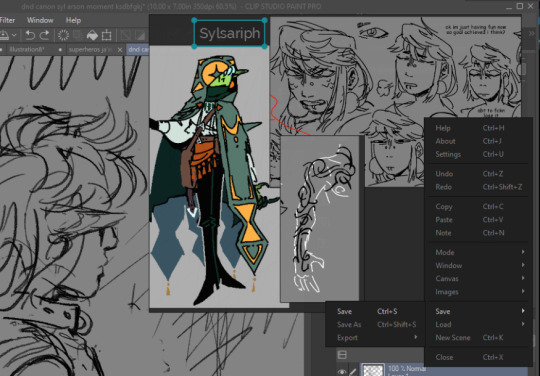
WhatColor
color describer. shows you details about the color your mouse is over. it's designed for colorblind folks, and I mostly use it because I have strong color filters on my screen 90% of the time for health reasons. however it's also helpful when you're learning to dissect color palettes and are trying to see how the perception of a certain color is affected by the colors surrounding it. use it to see how often ur brain gets duped into seeing purple when it's actually blue
compatible with windows 7/8/10
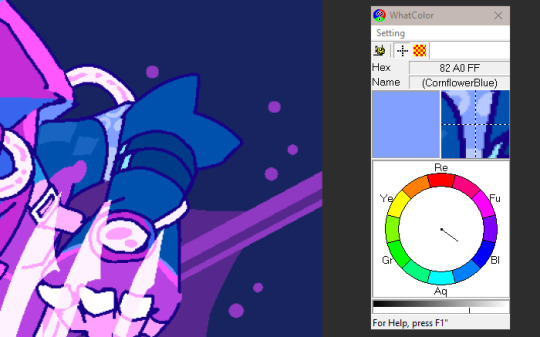
625 notes
·
View notes
Text
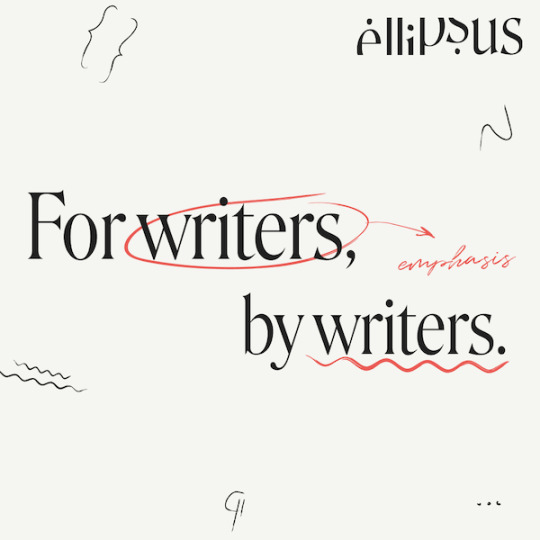
Collaborative writing is a labor of love. What if it could be easier?
Think connected drafts, not disconnected files.
Think effortless version history and control.
Think in-document chat.
Far away from the prying eyes of AI and LLMs.
Ellipsus is a new writing tool for people who write together!
Two new features have arrived this week: Comments and Dark Mode! :D
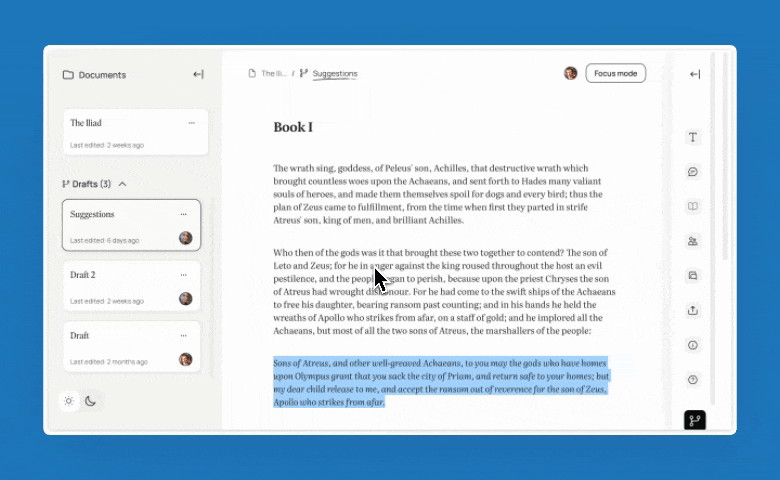
We’re looking for feedback from folks who care a lot about writing.
Check us out, and join the Ellipsus beta.
18K notes
·
View notes
Text
Lets talk OCs statistics
Tesing the format ✍️

Details and text description and details uder the cut!
The infographics of the results of the survey conducted in 2023. The question asked is 'Why do people create OCs?'. Total number of responses given: 332 Multiple answers could be selected for this question. 6 most popular answers are presented. 19% of people said that they do it for the sake of collecting (interesting designs, original species, etc.). 46% do it to interact with already established setting (selfinserts, fan-characters, etc.). 48% — for the sake of self-presentation (mascot character, artsona, alter-ego, etc.) 60% say, that their OCs appear as characters in a bigger story (or comic, or other type of project) 69% create OCs for role-playing (counts TTRPG games, text roleplaying, etc.) 77% said that creating OCs is a part of creative process and self-expression.






Another note I have on this question is that someone in the open response called their OCs a 'love letter' to their sources of inspiration, and I think that is beautiful.
Character creation is always a personal, artistic process, both original and in relation to one's surroundings and artistic ancestors! I find it fascinating.
The 69% for TTRPS and other roleplaying games is also fun. Nice.
#original character#original content#ID//posts#ID survey results#survey results#why do we create ocs#statistics
5 notes
·
View notes
Text
Exploring Character Backstory
1. Start with the essentials: Begin by outlining the basic information about your character's past, such as their family background, upbringing, education, and early experiences. Consider their cultural, social, and economic background, as these factors can shape their worldview and values.
2. Identify key events and milestones: Determine significant events or milestones in your character's life that have had a profound impact on them. These could include positive or negative experiences, such as the loss of a loved one, a major achievement, a traumatic incident, or a life-changing decision. These events help shape your character's personality, fears, and aspirations.
3. Examine formative relationships: Explore the relationships your character has had with their family, friends, mentors, or romantic partners. How have these relationships influenced them? What role models or influences have shaped their values, beliefs, and behavior? Relationships can provide insight into your character's vulnerabilities, strengths, and emotional attachments.
4. Dig into their beliefs and values: Understand what your character believes in and values. Examine their moral compass, political views, religious beliefs, or philosophical outlook. Consider how their beliefs might clash or align with the conflicts they encounter in the story. This will create depth and authenticity in their character development.
5. Uncover secrets and hidden aspects: Delve into your character's secrets, hidden desires, or aspects of their past that they prefer to keep hidden. Secrets can create internal conflicts, fuel character growth, and add intrigue to the story. They can also reveal vulnerabilities or flaws that make your character more relatable and complex.
6. Consider the impact of societal factors: Explore how societal factors such as gender, race, class, or historical context have influenced your character's experiences and identity. These factors can shape their struggles, opportunities, and perspectives. Understanding the societal context in which your character exists adds layers of depth to their backstory.
7. Connect the backstory to the main story: Once you have explored the character's backstory, identify how it relates to the main story. Determine how their past experiences, relationships, or traumas influence their present motivations, conflicts, and goals. This connection will ensure that the backstory serves a purpose in the narrative and contributes to the character's growth.
8. Use backstory selectively: While backstory is essential for understanding your character, avoid excessive exposition or information dumping. Introduce elements of the backstory gradually, through dialogue, memories, or subtle hints. This helps maintain reader interest and allows the character's past to unfold organically throughout the story.
Remember, not all aspects of the character's backstory need to be explicitly mentioned in the narrative. It's important to choose and reveal elements that have the most significant impact on the character's present circumstances and development.
#rb#materials#for writing#character creation#ideas#ID//reblog#great notes and descriptions of certain important aspects out here :]
5K notes
·
View notes
Text
Feelings Wheel
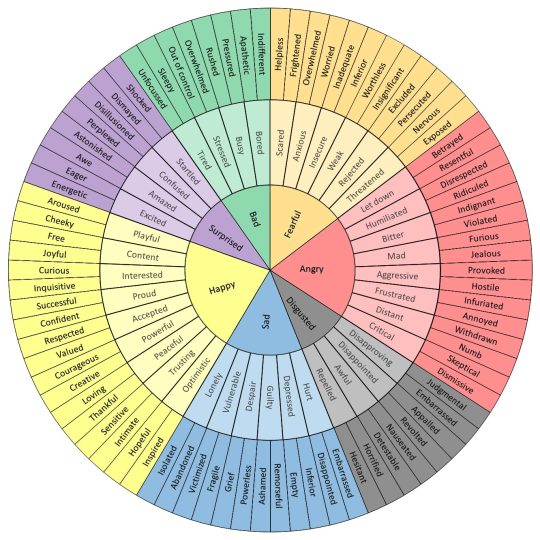
This is the feelings wheel by Geoffrey Roberts, shown to me by my therapist. My initial thought was, "what amazing synonyms to use for diverse emotional vocabulary!"
More than that, this wheel is great for understanding your characters inner motivations and reactions to situations. For example, if a character constantly feels helpless, then their overarching characteristics will be that they are fearful.
Characters who are less emotionally aware may use words and act in the inner most circle. Those much more aware of their emotions may describe themselves or express and use words from the outer most circle.
Hopefully you guys find this as helpful as I did! Let me know down in the comments.
Happy Writing!
9K notes
·
View notes
Text
Preparing to start posting stuff!
The project is starting its work ⭐⭐⭐

The first thing we plan to post is the survey analysis! In Autumn 2023, I ran a survey about OCs: why people create characters, how they share them with the world, what websites and tools they use. It had about 330 participants, and I learned a lot from it - so I think it's time to share some of the findings!
I'm also working on putting together some resource lists that could be used to work on D&D companions or setting creation! I think there's a ton of indie resources out there that are being overlooked, and I want to share them and their creators' sites, shops, and patreons on this blog! So the first list I'm doing is the mapmaker tools! hopefully it'll be out soon. ⭐
Also it's about time to start reposting cool authors and resourses more, hope this blog will become a good place for it!
#oc project#work in progress#art in post by nittroy (admin)#cw bugs#cw insects#project updates#ID//Posts
3 notes
·
View notes
Text
Hi! A little introduction to this blog 🔅
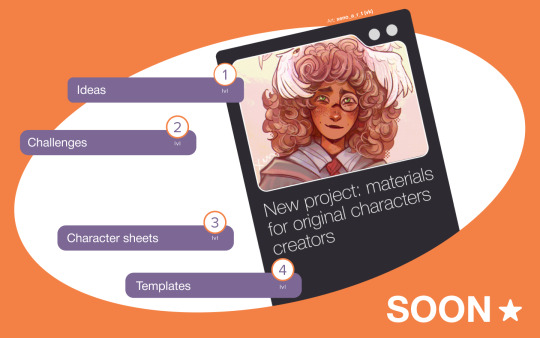
Identeca is a project I'm working on during 2023-2024 year in my university. The aim of the project is to research, collect materials and conceptualise instruments that would help original content artists and writers to design their character profiles and setting descriptions easily! I have created this blog to keep track of the materials that are created or discovered in the process. Here are gonna be posted: • The results of the survey I conducted some time ago about the current state of affairs in OC authors communities; • Project updates and testing information; • Invitations to betatests and surveys; • Ideas and drafts for OC challenges and profiles that we would come up with through testing; • Reblogs of materials and tutorials that I find useful and cool on tumblr and want more people to see! Hope this blog is going to be of a help to someone in the end!
#artists on tumblr#oc#original character development#original content#art tumblr#design#project updates#ID//posts#I'm required to make social media for my diploma project but I'M MAKING IT FUN
2 notes
·
View notes